News
Accepted for Google Search Labs? How to Try AI Experiments
If you've been plucked off the waitlist for Google's Search Labs, you now have access to early-stage experiments powered by advanced generative AI.
"Experimentation is part of Google's DNA," Google said last month in an announcement of the program. "Every year in Search, we do hundreds of thousands of quality tests and experiments to figure out how to make Google more helpful for you. Many of these ideas don't pan out, but some do, and it's through experimentation that Search gets better.
"That's why we're introducing Search Labs, a new way for you to sign up to test bold new products and ideas we're exploring. You'll be able to try out some early-stage experiments, and share your feedback directly with the teams working on them. Search Labs will introduce new, fun and creative ways to engage with Search and explore information."
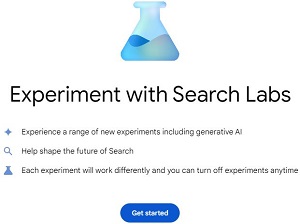 [Click on image for larger view.] Search Labs (source: Google).
[Click on image for larger view.] Search Labs (source: Google).
Users can try fun and creative ways to engage with Search and explore information in Chrome on the desktop or in the Google App for iOS and Android mobile devices. Those who are accepted and subsequently access the Search Labs by clicking on an icon are presented with experiments they can toggle on or off. If you haven't applied for the waitlist, you can do so by clicking on that Search Labs icon in the app or the Chrome new tab page, a blue beaker.
If you have been accepted from the waitlist, you have access to three time-sensitive experiments that end in September or December, enabled by simply clicking a "turn on" toggle button:
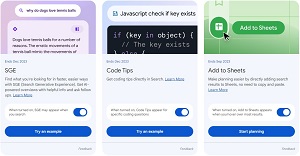 [Click on image for larger view.] Search Labs Experiments (source: Google).
[Click on image for larger view.] Search Labs Experiments (source: Google).
Search Generative Experience (SGE)
This feature brings the power of generative AI directly into Google Search, the company says. It aims to help users quickly find and make sense of information. As users search, they can get an AI-powered overview of a topic, pointers to explore more, and ways to follow up with questions posed in natural language, taking advantage of natural language processing (NLP).
"With new generative AI capabilities in Search, we're now taking more of the work out of searching, so you'll be able to understand a topic faster, uncover new viewpoints and insights, and get things done more easily," Google says in the May 10 article, "Supercharging Search with generative AI."
"Let's take a question like 'what's better for a family with kids under 3 and a dog, bryce canyon or arches.' Normally, you might break this one question down into smaller ones, sort through the vast information available, and start to piece things together yourself. With generative AI, Search can do some of that heavy lifting for you."
When such a question is posed, users will see an AI-powered snapshot of key information to consider, with links to dig deeper. For example, here's the snapshot for the above search:
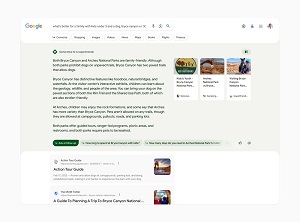 [Click on image for larger view.] SGE Snapshot (source: Google).
[Click on image for larger view.] SGE Snapshot (source: Google).
Note that not all queries will generate an AI-powered overview in search results, with some search results not including SGE content.
Other Experiments
While search is obviously the focal point for Google, the company also provides two other experiments:
-
Code Tips: This feature uses large language models (LLMs) to provide pointers for writing code faster and smarter. Users can ask how-to questions related to a specific programming language (C, C++, Go, Java, JavaScript, Kotlin, Python and TypeScript) and tools (Docker, Git, shells), along with algorithms. For an example, here's a screenshot for the response to "javascript check if key exists":
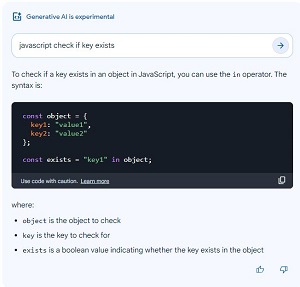 [Click on image for larger view.] "javascript check if key exists" (source: Google).
[Click on image for larger view.] "javascript check if key exists" (source: Google).
"Only a subset of queries will show Code Tips where we believe we can provide higher quality responses or suggestions," Google said. "Currently, the experiment is focused on queries related to Python, JS/TS, C/C++, Java, Kotlin, Go, and shell/bash as well as git, docker, and algorithms."
-
Add to Sheets: This feature helps users to insert a search result directly into a spreadsheet and share it with others. It can be used as a research companion for planning a trip and adding info to an itinerary, or for keeping track of other information found on Search. "For those who like coordinating with friends or family for things like travel, events, and more, Add to Sheets makes it easy to add search results to a collaborative spreadsheet," Google said.
Note that this experiment works only in Chrome desktop. Here's a screenshot of the response to "underrated summer travel ideas":
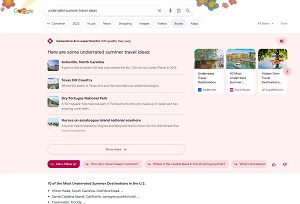 [Click on image for larger view.] "underrated summer travel ideas" (source: Google).
[Click on image for larger view.] "underrated summer travel ideas" (source: Google).
Note that not all results can be added to Google Sheets.
"Experiments may change how Google Search appears," the company said. "For example, you might get an AI-powered overview at the top of search results. Also, you might get different design layouts than you're used to. You can turn on multiple experiments at the same time, or try them one at a time."
About the Author
David Ramel is an editor and writer at Converge 360.